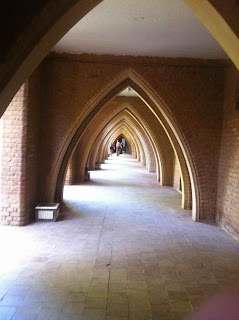 |
| University of Khartoum's lancet arches |
Many factors have impacted education in the Sudan including budget spread to a larger number of schools, fewer faculty members doing their graduate education abroad, national budget percentage allocated to education, and limited access to international academic literature. The University is endeavoring to open doors for school exchange programs with local colleges and universities in the US and forging partnerships for education; as the US sanctions on education, medical equipment and agricultural supplies have been lifted on the Sudan.
Lancet arches supporting the halls and historic buildings of Gordon College (now University of Khartoum) from the turn of the century bring to mind the cultural as well as climate appropriateness of Homes for Sudan's 'superadobe' housing proposals and projects. Unfortunately, HS4S's workshop in Khartoum - as it was the very first one - produced the least beautiful dome structure, but a sturdy one that survived flood and neglect. Nevertheless, the workshops trained multiple students from the University of Khartoum, several of the independent technical schools, and semi-independent building organizations. In 2015, one of HS4S's team members visited the dome dwelling built in Tonj in 2009. In spite of recent conflict in South Sudan, the structure is being used to house 10 people and has stood strong in all of the adversity with little impact other than some of the external plaster peeling off.
Funding and partnerships are still tricky with the monetary transfer restrictions, but there is no less need for the housing and the technical training. Combining 'superadobe' workshops with technical training and even a type of international cultural training (suggested by one of the Sudanese ambassadors) has been discussed with the university and the local businessmen. The students and the country in general could profit from encouragement and entrepreneurial leadership training. In Darfur as well as Khartoum, an embedded culture of entitlement and expectations for answers and money from abroad prevails, when in fact all of the requisite resources are in the country already - including human capital. Innovation, leadership, and courage are all that are required.
 |
| Arches of Gordon College |
The students at the university are very smart and eager to learn given open doors and willing faculty of which there are many. The opportunity to discuss masters' theses and general political science and international issues with the students is rewarding and the ability of the students to quickly grasp new concepts is impressive. The students have diverse interests for their theses, but one one recurring theme is the wisdom of the separation of South Sudan from the Sudan with all of its ensuing issues: citizenship, borders, loss of trade revenue, continuing conflicts, and new conflicts in the South. The students also have innovative ideas about the migration issues caused by conflicts in the MENA region and lingering issues on reconstruction and reconfiguration of governance in Darfur.
The University of Khartoum has regular visits of delegations from Darfur giving cultural demonstrations and local tribal dances on campus. The Darfur students receive financial aid for their tuition and housing from the government -- since the various peace treaties signed through international mediation have been partially implemented.
Homes for Sudan is proposing sponsoring some students for summer courses in the US as well as long distance learning courses on social entrepreneurship. Portland State University offers a certificate for online courses with training on leadership/entrepreneurship from the business school including a practicum section -- and is developing a partnership with the University of Khartoum. What is needed is funding for the students. La Sierra's Students in Free Enterprise (SIFE) are still eager and willing to partner with Homes for Sudan on various projects given a revived interest in Sudan.


No comments:
Post a Comment